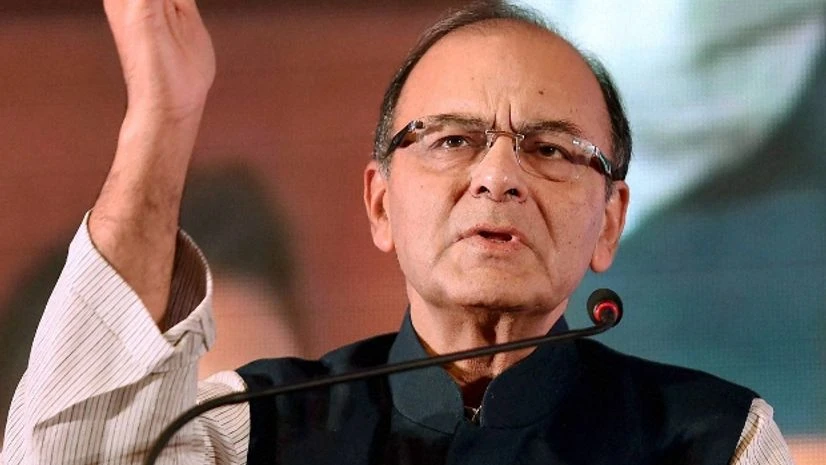Union Finance Minister Arun Jaitley on Wednesday said the April 1, 2017, deadline to roll out the goods and services tax (GST) was stiff, as there were a few hurdles ahead.
He added the Centre and states were “running against time”, and there were issues, which the proposed GST Council needed to address.
“After the notification and constitution of the GST Council, there are obviously some pending issues, which the council will have to resolve. So we have September and October, and, parts of November to do that,” said Jaitley at the The Economist India Summit in the national Capital.
Later, a senior finance ministry official said there were three issues — GST rates, dual control over assessment and scrutiny of assessees, and geographical or area-based exemptions.
“If we are able to successfully transact those issues, the pieces of legislation would be introduced in Parliament in the winter session. Looking ahead, it’s very stiff. We are running against time,” said Jaitley.
More than half the states have ratified the Constitution amendment Bill, passed by Parliament on August 6. Only the President’s assent is left to make it a law.
More From This Section
After the GST, Jaitley said, his primary concern was the health of public sector banks.
“If you were to ask me, after the passage and maybe possible implementation of GST, what would be my priority at the moment, it is certainly the health of public sector banks (PSBs),” he said.
The FM, however, ruled out privatisation of the public sector banks, adding public sentiment was against it.
“To reach a particular level of reform, you have to evolve into that stage of public opinion... In funding a large part of the social sector in India, public sector banks, despite competition, had a far larger contribution,” he said.
Jaitley was also very confident about the benefits of GST in the long run — plugging leakages and reducing the tax rate over time.
“In the long run, it will probably stabilise the tax rates and move them down. It will also bring a lot of equity within the country in terms of the consuming states being financially empowered more,” he said.
A finance ministry officials hinted the central GST and integrated GST Bills could be money Bills. Taxation Bills have never been financial Bills in history.
He also said a proposal is under consideration to tax those industries which avail benefits under area-based exemptions and then reimburse them. “In order to maintain uniformity under the GST, all units availing area-based exemptions will be asked to pay tax and get a refund.”
Currently, there are two types of area-based exemption schemes in operation.
While manufacturing units in Jammu and Kashmir and the Northeast get excise benefit by way of refunds, those in Himachal Pradesh and Uttarakhand get an outright exemption.
The revenue foregone by the Centre through area-based excise duty exemptions was Rs 19,120 crore in 2015-16.
While key Opposition party Congress wants the GST rate at less-than-20 per cent, states are calling for a more-than-20-per cent GST rate.
The Congress and the other Opposition parties also want the GST Bills to be financial Bills, as the government does not have a majority in the Rajya Sabha. The upper House does not have the authority to change a money Bill.
Chief Economic Advisor Arvind Subramanian, in his report on GST, has recommended a standard GST rate of 17-18 per cent based on the revenue neutral rate of 15-15.5 per cent.
The official quoted above also pointed out it was not necessary to approach the Cabinet for the constitution of the GST council as Parliament has already passed the Constitution amendment Bill, which has a provision for this.
The council will be chaired by the Union finance minister, with the minister of state for finance in charge of revenue, and state finance ministers or any other minister nominated by the states as members.
The vice-chairperson will be selected by consensus for a specified period.
Committing to "many more reforms", Economic Affairs Secretary Shaktikanta Das said implementation of GST will bring small and medium enterprises (SMEs) into the national value chain.
"The government is aware that many more reforms need to be taken. After implementation of GST, it should be easier for SMEs to become part of entire national value chain... Next challenge would be how to make SMEs part of global value chain," he said at the same event.
Jaitley said after the GST roll-out, improving the health of PSBs would be the government’s top priority. He said a large number of steps have been initiated to reduce the ballooning non-performing assets.
But ruling out privatisation of banks, he said public and political opinion was still to converge to a point where one could start thinking of privatising the banking sector.
Jaitley said some state-run banks would be consolidated and would continue to function in the present state. The government would reduce its stake in IDBI Bank to 49 per cent.
“We are trying to consolidate some of the banks, which may otherwise find it difficult in a competitive environment.”
State Bank of India, the country’s largest lender, is in the process of merging five of its subsidiaries — the State Bank of Bikaner and Jaipur, State Bank of Travancore, State Bank of Patiala, State Bank of Hyderabad, and State Bank of Maharashtra and Bharatiya Mahila Bank — with itself.
The net combined loss for the 25 listed PSBs was Rs 1,193 crore in the first quarter ended June 2016 against a net profit of Rs 9,449 crore in April-June 2015. Stressed assets in the banking system rose to 12 per cent in June 2016 from 11.4 per cent at the end of March 2016, reflecting pressure on state-owned banks.

)
